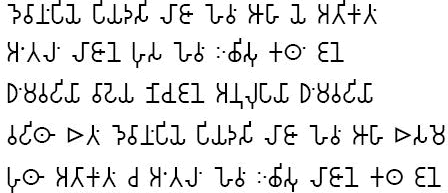Brāhmī AlphabetThe Brāhmī alphabet is the ancestor of most of the 40 or so modern Indian alphabets, and of a number of other alphabets, such as Khmer and Tibetan. It is thought to have been modelled on the Aramaic or Phoenician alphabets, and appeared in India sometime before 500 BC. Another theory is that Brāhmī developed from the Indus or Harappa script, which was used in the Indus valley until about 2,000 BC. The earliest known inscriptions in the Brāhmī alphabet are those of King Asoka (c.270-232 BC), third monarch of the Mauryan dynasty. Brāhmī was used to write a variety of languages, including Sanskrit and Prakrit.
Notable features- Type of writing system: abugida - each letter represents a consonant with an inherent vowel. Other vowels were indicated using a variety of diacritics and separate letters.
- Letters are grouped according to the way they are pronounced.
- Many letters have more than one form.
- Direction of writing: left to right in horizontal lines
Consonants
Vowels and vowel diacritics
Sample text Asokan Edict - Delhi Inscription
Asokan Edict - Delhi Inscription Transliterationdevānaṁpiye piyadasi lājā hevaṁ āhā ye atikaṁtaṁ
aṁtalaṁ lājāne husa hevaṁ ichisu kathaṁ jane
dhaṁmavaḍhiyā vāḍheya nocujane anulupāyā dhaṁmavaḍhiyā
vaḍhithā etaṁ devānaṁpiye piyadasi lājā hevaṁ āhā esame
huthā atākaṁtaṁ ca aṁtalaṁ hevaṁ ichisu lājāne katha jane
TranslationThus spoke king Devanampiya Piyadasi: "Kings of the olden time have gone to heaven under these very desires. How then among mankind may religion (or growth in grace) be increased? Yea, through the conversion of the humbly-born shall religion increase"
Some modern descendants of Brāhmī Bengali, Devanāgarī, Gujarāti, Gurmukhi, Kannada, Khmer, Malayalam, Oriya, Sinhala, Tamil, Telugu, Tibetan
Links
ALPHABETUM - a Unicode font specifically designed for ancient scripts, including classical & medieval Latin, ancient Greek, Etruscan, Oscan, Umbrian, Faliscan, Messapic, Picene, Iberian, Celtiberian, Gothic, Runic, Old & Middle English, Hebrew, Sanskrit, Old Nordic, Ogham, Kharosthi, Glagolitic, Old Cyrillic, Phoenician, Avestan, Ugaritic, Linear B, Anatolian scripts, Coptic, Cypriot, Brahmi, Old Persian cuneiform: http://guindo.pntic.mec.es/~jmag0042/alphabet.html
Writing system used to write Sanskrit
Ahom, Balinese, Batak, Bengali, Brahmi, Buhid, Burmese, Chakma, Cham, Dehong Dai, Devanagari, Dhives Akuru, Ethiopic, Evēla Akuru, Gondi, Grantha, Gujarati, Gupta, Gurmukhi (Punjabi), Hanuno'o, Hmong, Javanese, Kannada, Kharosthi, Khmer, Lanna, Lao, Lepcha, Limbu, Lontara/Makasar, Malayalam, Manpuri, Modi, New Tai Lue, Oriya, Pallava, Phags-pa, Ranjana, Redjang, Shan, Sharda, Siddham, Sindhi, Sinhala, Sorang Sompeng, Sourashtra, Soyombo, Sundanese, Syloti Nagri, Tagalog, Tagbanwa, Takri, Tamil, Telugu, Thai, Tibetan, Tocharian, Varang Kshiti
|

Tidak ada komentar:
Posting Komentar